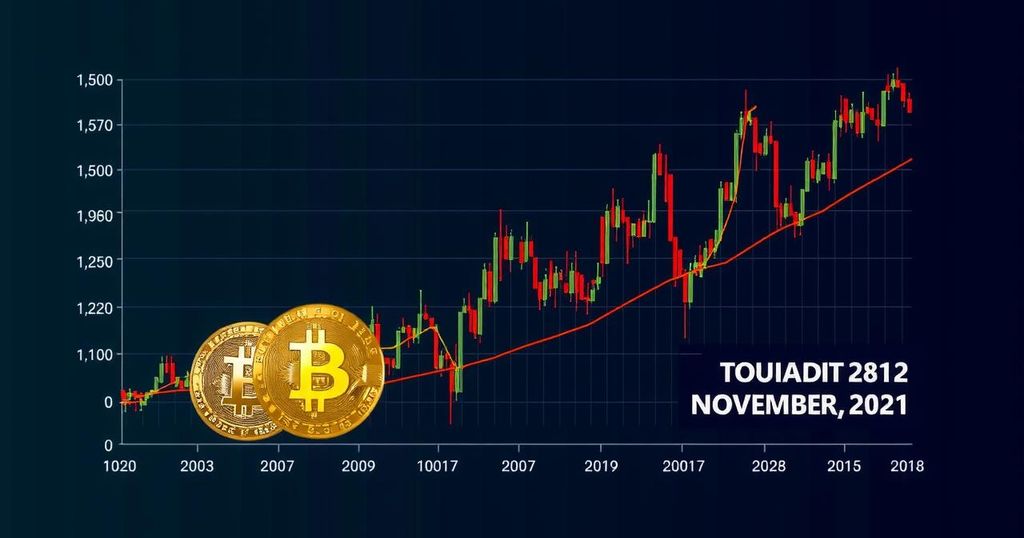Current Trends and Insights into Bitcoin Investment as of October 2024
As of October 25, 2024, Bitcoin’s price is $67,983.57, reflecting a 0.79% increase from yesterday and a 99.04% rise from one year ago. Bitcoin, seen mainly as an investment now, has a market cap over $1.1 trillion and has previously peaked above $73,000 in March 2024. The investment landscape includes direct Bitcoin purchases, Bitcoin IRAs, crypto ETFs, and related stocks, emphasizing a cautious approach due to its volatility. Predictions suggest Bitcoin could reach between $400,000 to $1 million by 2030.
As of October 25, 2024, Bitcoin, the first and most renowned cryptocurrency, boasts a market capitalization exceeding $1.1 trillion. Its current price stands at $67,983.57, reflecting an increase of 0.79% from the previous day. Over the past month, this cryptocurrency has seen a rise of 5.32% from $64,549.49, and a staggering annual increase of 99.04% from $34,156.50. Originally conceived as a technology for transactions, Bitcoin is widely regarded today as an investment asset, integral to diverse portfolios. Investors often view it as a hedge against inflation and a means of diversification. Compared to traditional blue-chip stocks, Bitcoin demonstrates considerable growth, significantly outpacing gains in major stock indices in recent times. Historically, the value of Bitcoin has surged, evidenced by an increase in price from $44,187 at the beginning of 2024 to an unprecedented peak exceeding $73,079 by March 2024. Many investors are drawn to Bitcoin for its potential higher returns compared to conventional investment vehicles, albeit it is not devoid of risk. Recent shifts have indicated fluctuating prices, with Bitcoin dipping to around $58,000 by September 2024. The price of Bitcoin is influenced by numerous factors, including its adoption for payments by major corporations like Tesla and Dell, economic conditions that change investor sentiment, and evolving regulatory frameworks. To invest in Bitcoin, one may consider direct purchases via cryptocurrency exchanges, establishing a Bitcoin IRA for tax advantages, or engaging with cryptocurrency ETFs (Exchange-Traded Funds) that track Bitcoin’s performance. Direct investments in stocks of companies involved with Bitcoin also present alternative methods for those seeking indirect exposure. Despite its volatility, Bitcoin’s future appears promising, with significant predictions suggesting it could reach prices between $400,000 to $1 million by 2030. The overarching advice remains to invest cautiously, ensuring that cryptocurrencies constitute a minimal percentage of one’s overall investment portfolio to mitigate risks associated with price fluctuations. As stated by Drew Feutz, certified financial planner, balancing crypto investments is prudent: “I suggest keeping their crypto position to 5% or less of their overall portfolio.” As Bitcoin matures within the financial landscape, its volatility may diminish, making it a potentially stable long-term investment opportunity.
Bitcoin is recognized as the pioneer of the cryptocurrency market, having been launched in 2009. Over the years, its popularity has surged, leading to significant price appreciation and market interest. This digital currency was originally designed as a medium for transactions; however, it has evolved into a highly sought-after asset class that attracts both retail and institutional investors. The increasing acceptance of Bitcoin as a legitimate payment method by numerous prominent companies adds to its credibility and appeal as an investment. Furthermore, Bitcoin’s historical performance showcases its capacity for substantial appreciation, prompting many to weigh it as a viable alternative to traditional investments as they seek diversification.
In conclusion, Bitcoin remains a leading cryptocurrency with substantial growth potential, as evidenced by its current valuation and historical performance. While the volatility associated with Bitcoin investment poses certain risks, the long-term outlook appears favorable, particularly as more businesses integrate cryptocurrencies into their economic operations. Investors are advised to approach Bitcoin cautiously, ensuring it forms a small fraction of their overall investment strategy to balance the inherent risks associated with this innovative asset class. As the cryptocurrency landscape continues to evolve, informed and measured investment in Bitcoin could prove beneficial.
Original Source: fortune.com







Post Comment